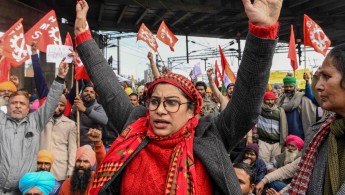Indian police open fire on protesters, as millions go on strike
Indian police fired live rounds Wednesday to break up a protest by strikers taking part in nationwide action against government economic policies, officials said.
The strike, called by unions which claim 250 million members, disrupted public transport, public-owned banks and some auto-industry factories across several states.
West Bengal was the worst hit, with police firing live rounds in the air to break up protesters who set fire to police vehicles and threw rocks at security forces in Malda district, north of the capital Kolkata, a senior police officer told AFP.
They also fired tear gas and baton-charged other protests in the eastern state, where many roads and railway lines were blocked.
Police said more than 150 arrests were made.
Ten unions called the one-day strike to oppose what they called the "anti-worker and anti-people policies" of right-wing Prime Minister Narendra Modi.
They were demanding increased minimum wages and pensions, and a halt to the privatisation of state firms and natural resources.
Farmers and students joined some of the protests called by the unions - who said "millions" joined the strike - piling pressure on an administration already confronting nationwide opposition to a new nationality law that opponents say is anti-Muslim.
The government had warned of "consequences" for anyone who stopped work, but could not head off the disruptions.
|
'Contempt towards labour'
Apart from West Bengal, the eastern states of Bihar and Odisha, Maharashtra in the west, Haryana in the north and Kerala and Karnataka in the south were worst hit by the action.
Some workers at state oil and coal firms, as well as motorbike makers Honda and Bajaj Auto, also joined the strike.
The government has been hit for weeks by the widespread protests since the nationality law passed on December 11 that have left more than 25 people dead.
Growing unrest in universities has added to social tensions.
"The attitude of the government is that of contempt towards labour," said the Centre of Indian Trade Unions, one of the groups organising Wednesday's strike.
Opposition parties backed the strikers, seizing on the government's struggle to get out of a severe economic slowdown that has weakened its standing less than a year after it won a landslide second term in power.
The government statistics office forecast Tuesday that annual growth would slow to five percent in 2020, the slowest pace in 11 years.
Last month the International Monetary Fund (IMF) said the government needed to act quickly to boost the economy.
Meanwhile, nationwide protests continue against a citizenship law passed in December that bars Muslims from a measure granting nationality to minorities from three neighbouring Muslim-majority countries.
Read more: Democracy languishes in Modi's anti-Muslim India
Hundreds of thousands of people have taken to the streets across the country, and more than 25 people have been killed.
Critics say the legislation goes against India's secular constitution, but Modi says the new law is intended to help "persecuted" minorities.
More than 60 student unions have supported the one-day strike called by India's trade unions.
Follow us on Twitter and Instagram to stay connected





 Follow the Middle East's top stories in English at The New Arab on Google News
Follow the Middle East's top stories in English at The New Arab on Google News
![Netanyahu furiously denounced the ICC [Getty]](/sites/default/files/styles/image_330x185/public/2024-11/GettyImages-2169352575.jpg?h=199d8c1f&itok=-vRiruf5)
![Both Hamas and the Palestinian Authority welcomed the ICC arrest warrants [Getty]](/sites/default/files/styles/image_330x185/public/2024-11/GettyImages-2178351173.jpg?h=199d8c1f&itok=TV858iVg)
